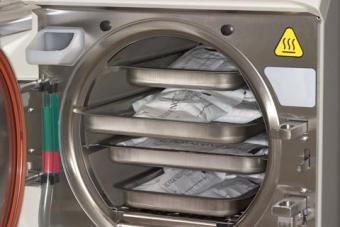
Every future professional tattoo artist has to start somewhere, and many choose to purchase tattoo kits to help learn the craft. You probably aren't going to get an apprenticeship until you have messed around a bit on your own. Tattoo kits provide you with an opportunity to do just that - ply your trade on fruit, leather and very generous friends. Before you lay out hard-earned cash for such a kit, acquaint yourself with the basics.
What Are Tattoo Kits?
If you're serious about learning how to create your own tattoos or considering opening your own shop someday, sooner or later you're going to find yourself looking at tattoo kits. Tattoo kits are packaged collections of the typical tools of the tattoo trade that are available for sale in most states to anyone at least 18 years old.
What Is Included a Kit?
There are hundreds of tattoo kits on the market. Each manufacturer has its own idea of what should go into a particular level kit, so one company's professional tattoo kit may be the equivalent of another company's intermediate set. Do your research before purchasing.
Beginner Kits
In the typical beginner's tattoo kit expect to find:
- One tattoo machine, although the quality of the unit varies with kit pricing
- Variable power supply unit to operate the tattoo machine (Make sure a foot operation switch and clip cord are included.)
- A set of inks and caps
- Disposable tubing
- Sterile tattoo needles
- Antiseptic wash (brands vary, but Green Soap is popular)
- Flash art
- How-to booklet
- Practice "skin"
- Company catalog for ordering further supplies
Intermediate Kits
An intermediate tattoo kit will usually contain the typical items found in a beginner's kit with a few variations:
- Two tattoo machines, one for lining and one for shading
- A larger supply of needles and tubing
- A larger selection of inks
- Caps plus a holder
- Stencil paper for transferring tattoo designs to skin
- Antiseptic supplies, plus various bandages, gauze, gloves, etc.
- Aftercare kit
Professional Kits
Professional tattoo kits will contain many of the same items found in the intermediate kits, but will usually come with a larger supply of everything.The biggest difference you will see with the professional kits is the inclusion of an autoclave with sterilization pouches and an ultrasonic unit. Both of these items are indispensable for sterilizing all reusable tattoo machinery and supplies between customers.

Note: It's strongly recommended that if you purchase a kit without an autoclave, that you buy one separately and follow operation instructions carefully.
Other Kits
In addition to the kits mentioned above, check out other body art kits, such as the ones that use henna to create Mehndi designs.
Kit Pricing

Comparison shopping is the key to finding a kit that has everything you want at the best price you can possibly find. Because the quality and number of supplies included in a kit can vary so much, prices range from an inexpensive $140.00 for a beginner's set up to as much as $2,000.00 for a fully equipped professional set. It is up to you to determine what you need versus what you can afford, but remember to think of your purchase as an investment. It makes sense to buy the highest quality equipment available, regardless of the kit size, even if you have to wait until you can afford it. Worst case scenario, if you eventually decide tattooing isn't for you, you'll have an easier time reselling better brand name equipment than the cheap stuff.
Before You Buy
Before you decide which tattoo kit to purchase, why not put some serious time into research first? One of the best things you can do is spend time at a shop watching the professionals at work. Observe the tools they prefer to use and get their advice on the brands that give them the top-quality results that both they and their customers demand.
If you already have some tattoos of your own, your artist might be willing to take you under his/her wing as an apprentice and help you choose a tattoo kit that will really give you the tools you need to get started.
A Word of Caution
Tattooing is definitely cool, but it can also be very dangerous. There's always a chance of causing injury to the person receiving the tattoo, allergic reactions do happen and both artist and customer are at risk for contracting blood borne diseases, if proper sanitation and sterilization are not carried out every step of the way.
- If you plan to give someone a tattoo, think seriously about whether you are properly trained and prepared to act responsibly. Remember; you will have someone else's health and safety in your hands.
- If you plan to get a tattoo from a non-professional, visit a professional tattoo shop first to observe sterilization procedures and ask yourself if the person who will be creating your tattoo looks prepared to offer you the same level of safety.
Where to Buy
Here are a few online sources for a wide range of tattoo kits. Quality varies, so comparison shop before making your purchase.
Getting Started
Once you have your tattoo kit, no matter what level it is, you'll likely want to get started right away. Many tattooists practice on the skin of fruit and there is even specially designed leather for the purpose of practicing on. After this, proceed to the less-visible areas of your body. If you're good enough, your friends may even let you tattoo them. Remember that tattooing is an art all its own and that just because you are handy with a pen and paper doesn't mean you will automatically be good at skin and ink. Like anything worth learning, tattooing takes practice; your practice will make perfect eventually.







